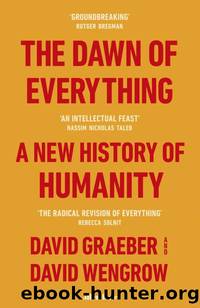The Dawn of Everything: A New History of Humanity by David Graeber & David Wengrow

Author:David Graeber & David Wengrow [Graeber, David & Wengrow, David]
Language: eng
Format: epub
ISBN: 9780241402450
Google: X8gZEAAAQBAJ
Publisher: Penguin UK
Published: 2021-10-18T16:00:00+00:00
Members of the council, we learn, were swayed by Xicotencatlâs words: âa murmur began among them, speaking with each other, the voices were rising, each one declaring what he felt.â The council was divided, and without consensus. What followed would be familiar to anyone who has participated in a process of consensus decision-making: when matters seem to come to loggerheads, rather than putting it to a vote someone proposes a creative synthesis. Temilotecutl â one of the cityâs four âsenior justicesâ â stepped in with a cunning plan. To satisfy both sides of the debate, Cortés would be invited into the city, but as soon as he entered Tlaxcalteca territory the cityâs leading general, Xicotencatl the Younger, would ambush him, together with a contingent of Otomà warriors. If the ambush succeeded, they would be heroes. If it failed, they would blame it on the uncouth and impulsive OtomÃ, make their excuses, and ally themselves with the invaders.
We need not rehearse here the events leading to an alliance between Tlaxcala and Cortés;56 we have said enough to give the reader a flavour of our sources concerning the democracy of Tlaxcala, and the facility of its politicians in reasoned debate. Such accounts have not fared well in the hands of modern historians. Few would go so far as to suggest that what de Salazar described never really happened, or was simply his own imagination of a scene from some ancient Greek agora or Roman senate, placed into the mouths of âIndiansâ. Yet on those rare occasions when the Crónica is considered by scholars today, it is mostly as a contribution to the literary genre of early Catholic humanism rather than as a source of historical information about indigenous forms of government â in much the same way that commentators on the writings of Lahontan never really concern themselves with what Kandiaronk might actually have argued, but dwell on the possibility that some passages might be inspired by Greek satirists like Lucian.57
There is a subtle snobbery at play here. Itâs not so much that anyone denies outright that accounts of deliberative politics reflect historical reality; itâs just that no one seems to find this fact particularly interesting. What seems interesting to historians is invariably the relation of these accounts to European textual traditions, or European expectations. Much the same occurs with the treatment of later texts from Tlaxcala: extant, detailed written records of the proceedings at its municipal council in the decades following the Spanish conquest, the Tlaxcalan Actas, which affirm at length both the oratorical skills of indigenous politicians and their facility with principles of consensus decision-making and reasoned debate.58
You might think all this would be of interest to historians. Instead, what really seems to strike them as worthy of debate is the degree to which democratic mores displayed in the texts might be some sort of near-miraculous adaptation by âastute Indiansâ to the political expectations of their European masters: effectively some kind of elaborate play-acting.59 Why such historians imagine that a
Download
This site does not store any files on its server. We only index and link to content provided by other sites. Please contact the content providers to delete copyright contents if any and email us, we'll remove relevant links or contents immediately.
Kathy Andrews Collection by Kathy Andrews(10693)
The remains of the day by Kazuo Ishiguro(7684)
Spare by Prince Harry The Duke of Sussex(4321)
Paper Towns by Green John(4255)
The Body: A Guide for Occupants by Bill Bryson(3959)
Be in a Treehouse by Pete Nelson(3286)
Harry Potter and the Goblet Of Fire by J.K. Rowling(3223)
Goodbye Paradise(3057)
Never by Ken Follett(3020)
Into Thin Air by Jon Krakauer(2777)
The Remains of the Day by Kazuo Ishiguro(2691)
The Cellar by Natasha Preston(2688)
The Genius of Japanese Carpentry by Azby Brown(2678)
Industrial Automation from Scratch: A hands-on guide to using sensors, actuators, PLCs, HMIs, and SCADA to automate industrial processes by Olushola Akande(2633)
Drawing Shortcuts: Developing Quick Drawing Skills Using Today's Technology by Leggitt Jim(2595)
120 Days of Sodom by Marquis de Sade(2507)
Machine Learning at Scale with H2O by Gregory Keys | David Whiting(2437)
Architecture 101 by Nicole Bridge(2418)
The Man Who Died Twice by Richard Osman(2416)
